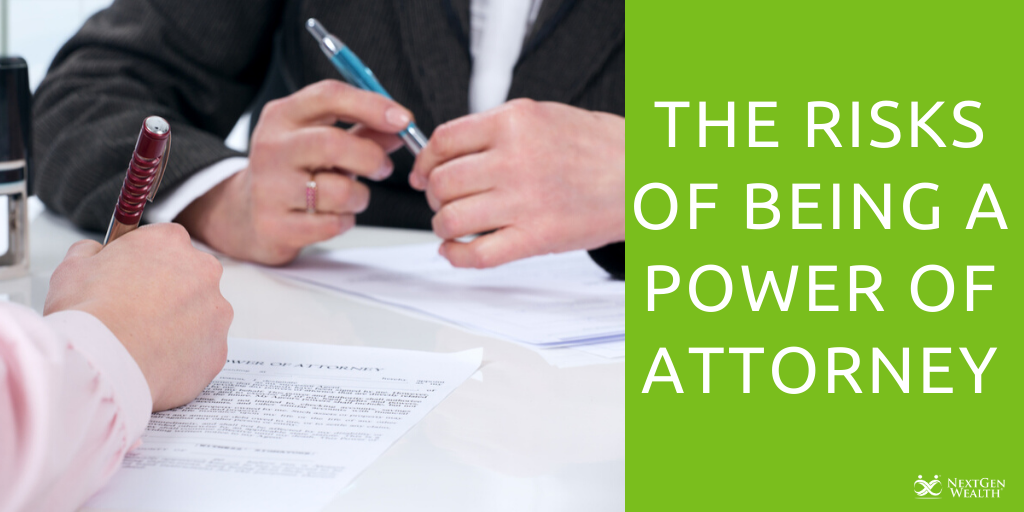The Risks of Being a Power of Attorney
This post was last updated on January 15, 2021, to reflect all updated information and best serve your needs.
As family members, we have a natural inclination to volunteer when it comes to helping with managing end of life affairs and estate planning. It’s what we do. We make sure our parents, siblings, and other extended families can count on us to pitch in now and in the future.
One of those responsibilities is signing on as power of attorney to better serve as executor of a will or to handle legal affairs should a family member pass on or become incapacitated. After all, they’re family, right? Well, first, you may ask yourself what is power of attorney?
Signing as a power of attorney is a common request among family members, but few people discuss the potential risks of agreeing to be someone’s power of attorney. You should be aware of the facts before you agree, and you should definitely be mindful of the liabilities.
Here’s an overview of the risks of being a power of attorney, as well as some tips about insulating yourself from risk should you decide to sign that agreement.
What Is a Power Of Attorney?
When you are given power of attorney by someone (referred to as the grantor, principal,, or donor), you are legally empowered to act as their agent. You can conduct business transactions as outlined in a general or limited power of attorney agreement, and in the eyes of the law, you are the grantor.
Most agents can buy or sell real estate, take on mortgages in the grantor’s name, and sign contracts. Essentially, you possess the legal authority to obligate the grantor to any contract or agreement as you see fit without taking on any personal legal or financial liability. There are some conditions under which you can be held liable, but these only occur under specific circumstances:
- Signing an additional agreement to be personally liable for financial or legal agreements.
- Relationship liability (next of kin, etc.) that has nothing to do with your POA.
- Handle the grantor’s affairs negligently, illegally, or with intent to commit fraud.
- Commit an action not authorized by your general or limited power of attorney.
Let’s dig a little deeper into the different types of POA and what legal and financial risk you are accepting by signing as an agent.
What Type Of Power Of Attorney Are You Signing?
There are three kinds of POA most agents sign at the grantor's request: a general durable power of attorney, limited durable power of attorney, and healthcare or medical power of attorney. Here’s a quick rundown of what they mean and the risks associated with each.
General Durable Power Of Attorney
This is the standard POA agreement for wills, estates, and finances. Agents can buy and sell property, pay bills, and conduct other financial business for the grantor. Durable means it remains binding should the grantor become incapacitated or pass away.
General POA’s carry the most risk for grantors and not agents, as there are few restrictions or liabilities on agents’ authority beyond generally applicable finance and fraud laws.
Limited Durable Power Of Attorney
This type of POA outlines the limited powers of the agent as stated by the grantor and/or their attorney. These POAs are becoming more common due to the amount of fraud and theft committed by agents with a general durable power of attorney. The stipulations of limited durable POAs varies by individual, but well-written limited POA agreements have precise requirements to which the agent must follow.
Limited durable POAs also incur the most significant risk for agents, as the grantor can create specific rules and restrictions about how their affairs may be handled. Personal liability for the agent is often a requirement should they violate these rules and regulations, so it is vital to read a limited durable power of attorney carefully before signing.
Moreover, it’s probably not a bad idea to have a lawyer of your own to check over any limited durable POAs before you sign. This will ensure you aren’t binding yourself to anything that would put you in legal or financial jeopardy.
Healthcare Or Medical Power Of Attorney
This is a simple, limited POA that allows the agent to make healthcare and medical decisions should the grantor become incapacitated and require guardianship. It’s essential to recognize that this type of POA carries an extremely low risk for the agent, and no agent will be held financially responsible for the medical bills of the grantor.
In many cases, healthcare or medical power of attorney agreements will have multiple successor agents listed if an agent cannot fulfill the duties or responsibilities of their POA. This is an excellent way to take the pressure off of family members who may not be in a position financially or with their time constraints to care for an ailing or incapacitated family member.
It’s also important to ask who the other agents are if you are asked to sign a healthcare/medical POA. Knowing who your successors are on the POA can often alleviate tension and stress should it become necessary for you to discharge your duties as an agent. You may have to take a hard look at your life and recognize if you can’t meet your obligations to the grantor due to your life or financial circumstances.
Acting as an agent of a healthcare/medical POA can be time-consuming and stressful, and you may decide at a future point in time that you need to prioritize your own family and needs over the grantor's needs. This consideration should be made when signing any POA, but especially when agreeing to act as an agent for a healthcare/medical POA.
Risks Of Agreeing To Act As Agent For A Power Of Attorney
Your risks as an agent vary by the type of POA and terms you agree to when signing the agreement. However, here are some significant risks to consider when you sign on as an agent that can be applied to most if not all POAs:
Making Yourself Personally Liable For Decisions And Financial Choices
While most general durable POAs protect you from general legal and financial liability, it’s still possible to inadvertently make yourself liable for certain transactions or decisions when acting in the name of the grantor,
For example, there have been documented cases where a family member was the POA agent for a sick relative and needed access to the grantor's mortgage account so bills could be paid on time. The bank holding the mortgage said the POA would need to cosign on her father’s mortgage before she was permitted to access the account.
The bank officer in question was actually breaking the law by not complying with the POA and requiring an additional guarantor on the mortgage. They should have honored the POA agreement and provided the agent immediate access to the account. Had the agent co-signed the mortgage instead of consulting the family lawyer, they would have been stuck consigned to the mortgage for the remainder of the term.
The bank would have been within its rights to seek financial compensation from the agent should the mortgage go into default. That includes placing liens on property owned by the agent until the mortgage was settled or paid.
Bottom line, if anyone is asking you to sign additional guarantees or paperwork as the POA, check with a lawyer before you sign. You may be setting yourself up for a world of hurt financially.
Legal Or Financial Liability Due To Your Personal Relationship With The Grantor
Spouses are considered the first next of kin in the eyes of the law. As such, it is generally unwise to give a spouse POA over your affairs as it could adversely affect them financially and legally should they need to use that POA. Suppose you insist on making your spouse or close relative an agent of your POA. In that case, the recommendation is to use a limited durable power of attorney and not a general power of attorney.
Giving unlimited access to your finances, credit, and legal affairs to anyone who isn't a licensed attorney under the bar association’s authority is unwise at best and catastrophic at worst. Furthermore, as your next of kin, they may actually become legally and financially liable if they are the ones inheriting your property when you pass on, rendering the POA moot.
The best option all around to avoid this liability is to create that limited power of attorney. If you can, you may want to consider creating a trust for your assets and property managed by a third party rather than giving a spouse or close family member POA. This is also better than leaving them your estate as an inheritance to avoid creating financial and legal liability.
Mismanaging A Grantor’s Finances & Property
Sometimes, either through willful intent or blissful ignorance, agents of a POA can cause legal and financial chaos. If the terms of the POA are too broad (as with a general durable POA), the agent can buy and sell property at a loss, mismanage a business into the ground, or even create the appearance of theft or embezzlement unintentionally.
As the agent, you may be insulated from many of these since you act for another in their name, but that doesn’t mean you have Carte Blanche to do as you please.
If you are found to be fraudulently using your power of attorney to enrich yourself, drain savings and other financial accounts, or default on lines of credit or loans, the law is going to shut you down quickly. Due to these restrictions, you want to make sure that you are an exemplary steward of the grantor’s affairs. In the past, people have been wary of POA’s, as some agents named in the agreement have viewed their POA as a “license to steal.”
Creating a limited durable power of attorney agreement is an excellent way to protect everyone involved from potential risk, but there are other precautions you can take to avoid being accused of negligence, fraud, or outright theft.
First and foremost, never commingle grantor assets with your personal assets. Transfers of this kind can create complications and attract scrutiny and give the appearance of wrongdoing. It is critical that you maintain an aboveboard, open record of everything you do as a POA agent.
Additionally, always conduct business for the grantor in the same open, separate way. When people start playing fast and loose with ownership of property and assets, that’s the start of a slippery slope into fraud, theft,, and mismanagement. Don’t even go there.
Committing Actions That Violate The POA Agreement
Before you sign anything as an agent in a POA, you want to make sure you clearly and thoroughly understand the rules, stipulations, and limitations of the agreement. Even unintentionally violating any of those rules can result in legal and financial liability for you even though you were acting as the grantor’s agent.
Obviously, it’s important to read what you sign, but it is recommended you review any POA with your own lawyer before agreeing to sign. It does incur a cost to you, but you want to be certain you aren’t signing up for more than you can handle financially or legally.
Know What You’re Signing Up For
Before you begin the process of putting together your own POA, it’s crucial that you first:
- Make sure it’s a suitable estate-planning document for you and/or your loved ones
- Please familiarize yourself with the correct power of attorney for your state because each state has its own form and laws surrounding what constitutes a valid POA.
Grantors
If you’re trying to draft your own POA as a grantor, it can be hard to know where to start. Understanding when you need to use a power of attorney, the most common situations for each type, the complicated language, the multiple types of powers of attorney forms, and understanding what to include may feel overwhelming.
There are also other legal documents tied to mapping out your financial future related to but different from power of attorney forms, not to mention many types of POAs (as outlined above).
Putting in the effort now will help ease the burden on you as a grantor in the future, and you can even rest better now knowing trusted individuals are in charge during a medical or familial crisis.
Agents
As an agent, it also behooves you to learn how power of attorney works in your particular state. Make sure you’re not inadvertently responsible for causing a financial problem during an emotionally charged time by reading up on your rights as an agent and better understanding the type of POA you’re signing.
If you’re looking for more information about the ins and outs of this document — as an agent, grantor, or someone who may become either at some point in their lives — visit Legal Template’s Power of Attorney page. They further touch upon how to get an agent, what constitutes a good agent, and explore some frequently asked questions regarding this critical legal document.
They also provide links to state-specific POA templates, so you can explore how this document operates in your state of residence.
Final Thoughts & Advice
Remember that the one way to guarantee you have zero financial or legal liability is to reject the grantor’s request to be their agent in a POA agreement. Agreeing to act as an agent for a friend or loved one seems like a natural thing to do, but take time to give it serious consideration before you sign on the line.
Life happens, people change, and so do circumstances. You don’t want to end up saddled with legal and financial obligations you cannot handle because you agreed to be an agent as a favor to a friend or loved one.
Provided you follow the above advice to insulate yourself from risk and complete your due diligence of any POA, you shouldn’t feel compelled to reject any offer out of hand either. Begin by recognizing what your agreement entails, and follow your mind over your heart.
Do you need help with establishing a POA? Are you unsure if you want to be an agent? Feel free to reach out to us. Our team is ready and willing to help you ensure that everyone involved is protected and is accepting minimal risk for their involvement. Call or visit us today for more information.


